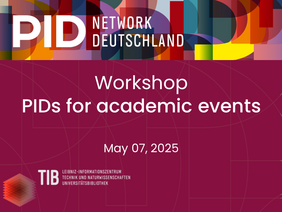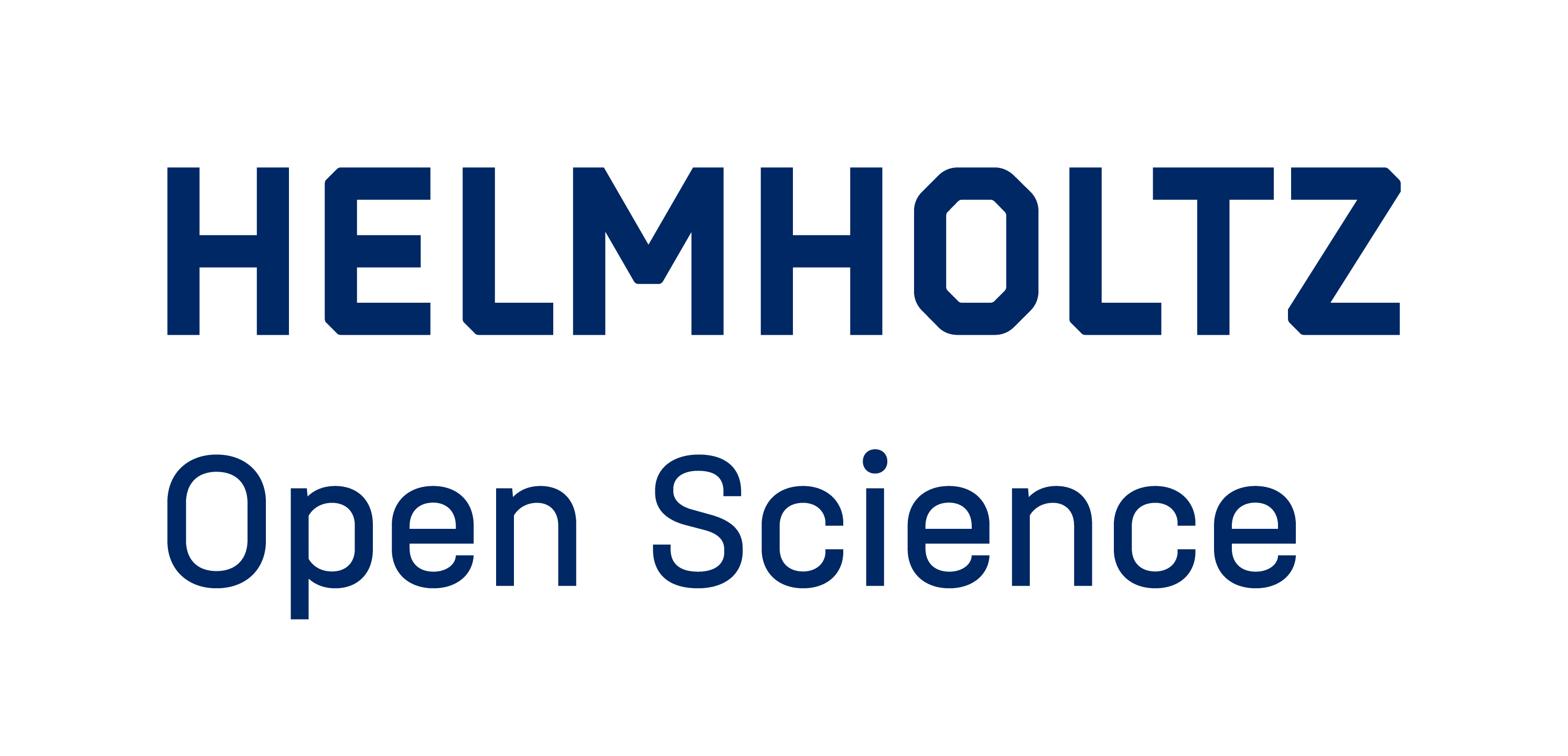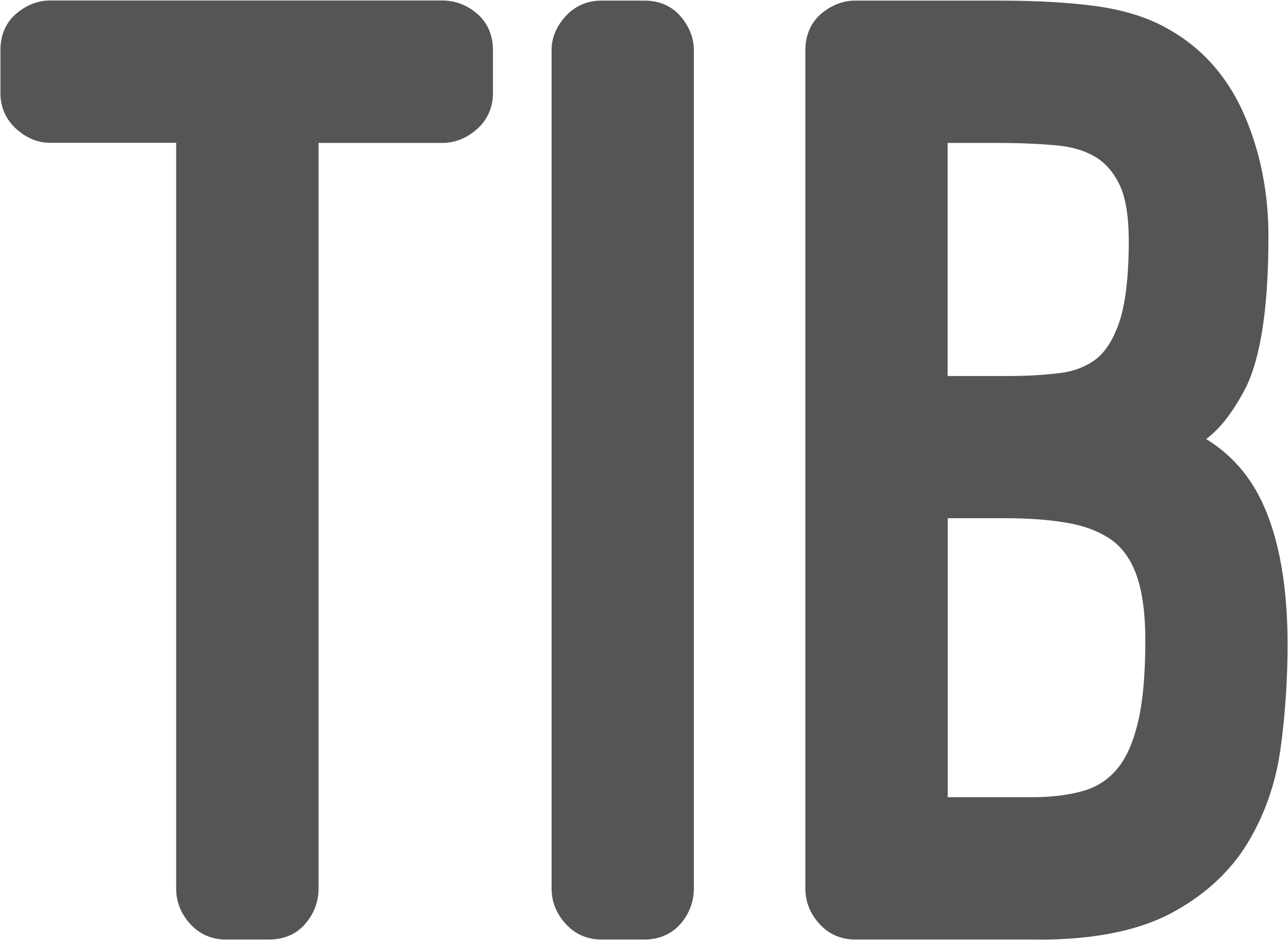Persistent Identifiers (PIDs) were recognized as essential tools for improving the discoverability, accessibility, and reusability of research resources at a recent workshop. The event highlighted how PIDs enable precise identification, reliable tracking, and long-term availability of metadata, serving as a cornerstone for integrating research outputs into the scholarly ecosystem. While the use of PIDs for resources like text publications, research data, and researchers is widely recognized, the workshop focused on the underutilized application of PIDs to academic events such as conferences or workshops – despite these events being vital drivers of scholarly communication and collaboration.
The goal of the workshop, part of the event series organized by the PID Network Deutschland project, was to explore the role of PIDs in improving the organization, visibility, integration and quality control of academic events within scientific information infrastructure systems. Diverse information needs of stakeholders – including researchers, conference organizers, publishers, librarians, funders, and research organizations – were addressed throughout the day.
It became evident why PIDs are crucial for academic events and how the lifecycle of these events can be effectively described using robust metadata. Tools and platforms that can leverage event PIDs were showcased, and discussions centered on how researchers and organizations can benefit from their adoption – not only for discovery and citation purposes but also for research assessment. Participants learned how PIDs facilitate the connection of diverse outputs from academic events – such as proceedings, videos, slides, and posters – and play a pivotal role in cataloguing and linking event-related information.
The event fostered a deeper understanding of the different perspectives and needs of stakeholders in the description and archiving of academic events. Participants gained insights into existing practices, tools and platforms, as well as the future development of metadata standards.
Interactive Session
During the final interactive session, participants brainstormed different questions about PIDs for academic events. The first round addressed the importance of PIDs for events. Participants consistently emphasized the important role PIDs play in improving visibility, accessibility, and the long-term preservation of data.
Specifically, PIDs were seen as enabling
- Improved Discoverability: Making events and associated resources easier to find.
- Enhanced Interoperability: Facilitating data exchange between different systems.
- Standardized Data: Promoting consistent metadata schemas and improving data quality.
- New Service Development: Enabling the creation of innovative services, such as integrated event calendars.
Participants emphasized that PIDs are a foundational element for building an interconnected event information ecosystem, not merely a technical solution. This ecosystem ultimately supports research, collaboration, and knowledge sharing.
An event PID Wishlist
The second brainstorming session identified key features for improving event PIDs. A standardized definition of what constitutes an Event-PID is foundational to success, ensuring consistency and avoiding ambiguity. Dates, times, and metadata must be formatted in machine-interpretable ways to enable automated processing, data exchange, and interoperability for analysis. This includes robust APIs and seamless integration with existing research tools.
Participants also emphasized the importance of usability, suggesting features like autofill in online forms and clear documentation. To encourage wider adoption, consider using a CC0 license, which allows for unrestricted use and distribution of event data. Prioritizing these features — standardization, machine-readability, and open licensing — could maximize the impact of event PIDs and foster more open, accessible, and reproducible research.
Vision of a networked PID ecosystem
Participants envision a robust and interconnected event PID ecosystem that links all relevant entities – organizers, publishers, and related data – to event identifiers. Key elements include a clear understanding of roles and responsibilities, a user-friendly interface, and a focus on providing value to researchers. The ecosystem should prioritize clear data connections, a well-defined registration process, and a resilient, yet decentralized, infrastructure. The goal is to create a valuable resource that promotes wider acceptance and enables better data management within the event landscape.
Building a PID network
Participants identified key challenges to wider adoption of PIDs, including a lack of awareness, financial costs, perceived exclusivity, and a shortage of user-friendly tools.
The participants' vision for a robust PID network is based on the FAIR principles (findable, accessible, interoperable, reusable) that is sustainable and widely used. Addressing these challenges and realizing this vision requires increased awareness, adequate funding, and a focus on creating value for users. Key priorities include reducing researcher effort, addressing legal challenges, and securing adequate resources. A top-down implementation approach was suggested, alongside a need to clarify the value proposition for researchers.
Program:
| Presentation | Abstract | Speaker |
| This presentation defines the concept of an academic event and explores the development of PIDs for such events, addressing key challenges and requirements from various stakeholders. It focuses on ConfIDent, a metadata registry service designed to fill the gap in research information infrastructure by providing a DOI and standardized metadata aligning with ConfIDent metadata schema and schema.org for academic events. While PIDs for publications, researchers, or organizations are well-established, academic events lack similar structured identification. | Stephanie Hagemann-Wilholt (TIB) | |
Metadata for Academic Event PIDs | This presentation takes a look at how academic events are being reflected in PID registrations and what kind of metadata are provided for them, focusing on DataCite DOIs. With metadata schemata not specifically tailored to academic events, how can PID metadata still distinguish academic events from other kinds of events, and from their output? In existing PID metadata, how well documented are the connections between events and their context, contributors, output, etc.? | Robin Kraus (TIB) |
AIDA Dashboard | The AIDA Dashboard is a powerful system, developed in collaboration with Springer Nature, for analysing and comparing scientific journals and conferences. By leveraging a large-scale Knowledge Graph that integrates billions of data points about research from multiple sources, it offers unique, sophisticated analytics and rankings. This helps inform critical business and editorial decisions for those navigating the research publishing world. | Angelo Salatino (Open University) |
Persistent Identifiers for Academic Events at CERN | At CERN, managing and preserving academic events is a key component of our scientific information ecosystem. Indico serves as our event management system, facilitating the organization of conferences and workshops. CDS, our institutional repository, ensures the long-term archiving of publications, including presentations and proceedings. We also operate Zenodo, a globally accessible platform that supports open science across all disciplines, and INSPIRE, the central hub for the High Energy Physics community, where users can register upcoming conferences, enabling the automatic indexing of proceedings when they are published in various repositories. In this talk, I will explore the current use of Persistent Identifiers (PIDs) in our workflows, the challenges we face, and the need for a global registry, along with improvements in metadata quality, discoverability, and integration. | Nicola Tarocco (CERN) |
Der GI-Veranstaltungskalender: Herausforderungen und Möglichkeiten von PIDs für wissenschaftliche Events aus Sicht einer Fachgesellschaft | Die Gesellschaft für Informatik e.V. (GI) ist mit knapp 20.000 Mitgliedern die größte Fachgesellschaft für Informatik im deutschsprachigen Raum. Die 14 Fachbereiche, etwa 150 Fachgruppen, 30 Regionalgruppen und verschiedenen Arbeitskreise und Task Forces veranstaltet unzählige Fachkonferenzen, Symposien und Workshops. Der Veranstaltungskalender der GI umfasst jedes Jahr knapp 500 Veranstaltungen. In seinem Vortrag spricht Daniel Krupka über die Herausforderungen und Möglichkeiten von PIDs für wissenschaftliche Events aus Sicht der GI. | Daniel Krupka (GI e.V.) |
Current features of the EconBiz event calendar | Current Features of the EconBiz Calendar of Events Conferences etc. were integrated as a resource type "events" relatively early in the history of the subject portal EconBiz. Over the years, requirements and indexing and presentation of the events changed. Unique identifiers for events and for relevant metadata fields are not yet achieved. More collaborative or automated indexing as well as PIDs could help to optimize workflows and coverage. Beta-Services: Since 2009 the events were automatically posted through Twitter/X, since 2025 they are only posted through a new Bluesky account: bsky.app/profile/econbiz-events.bsky.social | Tamara Pianos (ZBW) |
| As a publisher of open access conference proceedings series, TIB Open Publishing has a vital interest in persistent information about the conferences the proceedings volumes correspond to. Often, same URLs are reused by subsequent conferences or websites are not maintained after the end of an event. This can cause downstream problems for publishers: e.g., some indexing services inquire about scientific committees and other conference details. Hence, if such information is lost it might have negative impacts on the visibility of conference publications. The presentation explores how conference PIDs could help to avoid those problems. | Xenia van Edig (TIB) |
Accessibility, linkability and citability as early as possible. PID’s for event recordings and any scientific videos | The TIB AV-Portal turns scientific videos into "real publications", which can be cited to the second using a combination of Digital Object Identifier (DOI) and Media Fragment Identifier (MFID). Conference recordings are used to demonstrate the practical added value and advantages of PIDs for scholarly audiovisual material. | Matti Stöhr (TIB) |
Digital Objects Identifiers (DOIs) for scientific events in library catalogues – a librarian’s lecture | As part of the metadata curation in ConfIDent each scientific event obtains a Digital Object Identifier (DOI) from DataCite, in order to ensure the persistent accessibility of the dataset. The dissemination of DOIs of scientific events in metadata descriptions for events and publications in various library catalogues leads to multiple links between platforms, to better visibility of the DOIs and to an increase in the level of awareness of ConfIDent among library users and researchers interested in finding the right academic conference to attend. This presentation provides an overview of the various library catalogues and metadata types into which DOIs for scientific events can be added, and gives an outlook on further possible connections between datasets. | Diana Friedrich (TIB) |
Conferences and Workshops in the dblp Knowledge Graph | The dblp computer science bibliography is not only an open indexing service and search engine for computer science publications, but also a directory of all major computer science journals and conferences. We show how this open data is organized and linked in the dblp Knowledge Graph and how it can be used to gain insights into the evolving field of computer science. | Marcel Ackermann (Schloss Dagstuhl | dpbl) |
Conferences in the Integrated Authority File (GND) | This presentation provides an introduction to authority records for conferences and their entry in the Integrated Authority File (Gemeinsame Normdatei GND). | Esther Scheven (DNB) |
Towards responsible research evaluation with conference metadata and PIDs | Conference organization is a lot of work, and it is oftentimes not rewarded. To uncover this invisible work, there needs to be a foundational layer of trustworthy metadata. In this presentation concepts of responsible research evaluation will be discussed and a use case will be described. One key aspect will be the role of research information systems in evaluating this important part of the academic life. | Christian Hauschke (TIB) |
The workshop's DOI is https://doi.org/10.25798/8jzc-sm02.







